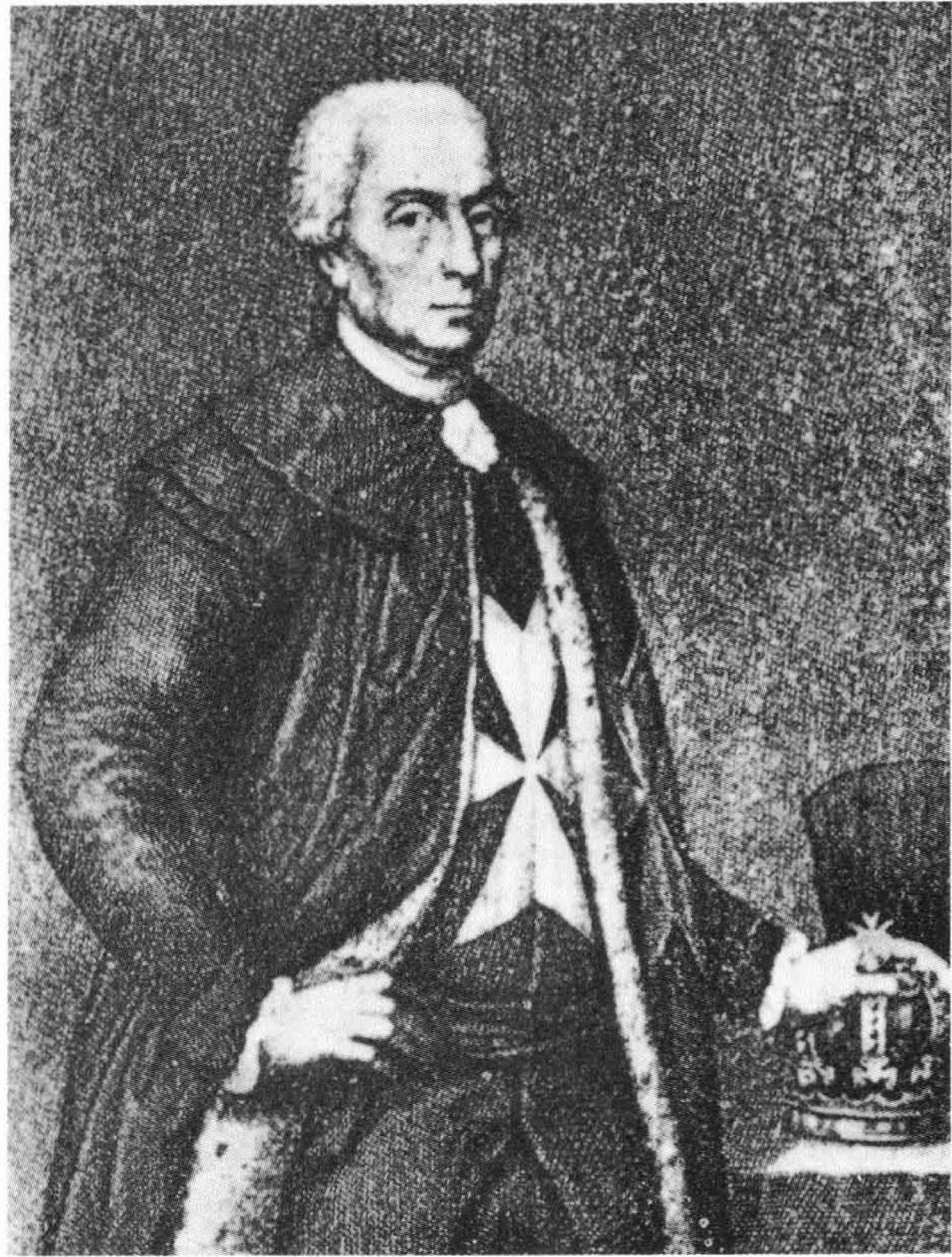Paul’s son, the young Alexander I, appointed the Bailli Soltykov as Lieutenant of the Order, but renounced both the Grand Mastership and the claim to Malta, with a view to a regular election and a legitimate claimant. The same ends were envisaged by the Treaty of Amiens, signed a year later, which stipulated that Malta should be returned to the knights, though on the condition that French and English members should be excluded from the Order. It only remained to find a Grand Master to take possession. With notable disinterest the Russian council decided to relinquish its control and, in order to circumvent the difficulties and delays of a Chapter General, proposed that the Pope should appoint a Grand Master from a list of candidates nominated by each Priory. Even this solution, however, was not proof against the Order’s enemies. The King of Spain made official the de facto schism of his four priories, subjecting them to his own rule, and thus (with the exclusion of the French Langues) reducing the Order to only eleven of its priories. Bonaparte, having described the plans for Malta as ‘a romance that
Could not be executed’, urged Bavaria to a second attempt at abolishing its Grand Priory, though Russian protection proved strong enough to protect it for the moment; he succeeded, on the other hand, in putting pressure on Pius VII to override the Order’s nominations and attempt (September 1802) to confer the Grand Mastership on the Roman knight Bartolomeo Ruspoli. Although Ruspoli refused the offer the delay was fatal; it was not until February 1803 that the place was filled by the appointment of the Bali Giovanni Tommasi, who had played a courageous part in the ill-fated defence of Malta.
Tommasi was living at Messina, from where he immediately sent an envoy to Malta to demand the cession of the island promised at Amiens. Unfortunately in the twelve months that had elapsed since the treaty the international situation had changed for the worse; French annexations had shown that Bonaparte had no thought of letting the treaty inhibit his expansionist aims, while his projects in Tunis and Egypt pointed the danger especially at Malta, It was the elegance of French policy to make the Treaty of Amiens unworkable in practice while leaving to Britain the odium of breaking it in the letter. The military governor of Malta professed to regret that none of the four magistral palaces was in a state to receive its proper occupant, and advised that he would be more comfortable where he was. In fact the British government was making up its mind to prevent France from obtaining a foothold in the central Mediterranean - an intention that was made all the clearer when Bonaparte offered to let Britain keep Malta in return for France’s acquisition of Taranto and Otranto. In May 1803, after a year of uneasy peace, the two countries resumed the war, and the return of the knights to Malta receded from the field of practical politics.
Tommasi reconstituted the Convent in Messina by summoning a Chapter General, which ratified his appointment. He refused Bonaparte’s attempt to suborn him with a pension of 300,000 francs, and when it was feared that the French fleet might appear at Messina he left abruptly for Catania, where the Duke of Carcaci put an elegant palazzo at his disposal. When he died in June 1805 the Convent confirmed the Ball Guevara Suardo as Lieutenant, and on 17 June the thirty-six members present in Catania elected to the Grand Mastership, subject to the

Grand Master Giovanni Tommasi.
Confirmation of the Pope, the Bali Giuseppe Caracciolo dei Marchesi di Sant’Eramo. As a Neapolitan, Caracciolo was considered an instrument of that court, and therefore of England; and Pius VII, who was continuing the policy of subservience to France that ended in the annexation of the Papal States, refused to confirm him. The government of the Order thus devolved upon the Lieutenant. When we consider that France’s attitude could hardly have been more hostile if the Duke of Wellington himself had been Grand Master, we may regard the Pope’s policy as one of the more unnecessary disadvantages the Order laboured under in these and subsequent years. The Czar, however, recognised Caracciolo’s title and granted him a pension of
12,000 roubles from the revenue of the Russian priories.
With the death of Tommasi ended the brief respite given to the calamities of the Order; the French invasion ofitaly forced the King of Naples, in January 1806, to take refuge in Sicily, and made him a helpless vassal of British sea-power. Guevara Suardo tried to move the Convent to
Rome, where its neutrality would be less compromised, but the government blocked this attempt by refusing passports and transferring the Order’s treasury to royal keeping in Palermo. It was never returned. A further consequence of the invasion was to put the restoration of Malta out of the question, by making the island an essential base for the defence of Sicily. In August 1806 there were peace negotiations between England and France, in which it was proposed that the former should keep Malta as a permanent possession, and this is the first evidence that such a prospect was envisaged by the British government. The work of hindsight historians, who suggest that as early as the 1780s the days of Maltese independence were numbered, has obscured this point. We have seen that Britain passed over two opportunities, in 1793 and 1795, to bring Malta within its sphere of influence; and after 1798 it was ready to hand back the island to Paul of Russia, the Neapolitans or the knights. Nelson himself, who favoured a more vigorous policy than his own government, urged that Britain’s only interest was to keep the island out of the hands of France: ‘The possession of Malta by England would be a useless and enormous expense... I attach no value to it for us. The need to retain Malta was only gradually impressed on the British government by the ever-widening aggression of the French in Italy.
The Napoleonic Wars completed the destruction of the Order in Europe. Between 1805 and 1810 the commanderies of Germany, Italy, Bavaria and Russia were swept away; Portugal was ravaged by the yearly invasions of the French; in Sicily Lord William Bentinck tried to have the Order dissolved, and though he did not formally achieve that end, the commanderies were sequestrated for the benefit of the royal Treasury. Only the Priory of Bohemia remained, protected by the Habsburg monarchy, and even that precariously, for in 1813 there was an attempt - foiled only by the diplomacy of the Order’s ambassador — to fuse it with the Order of Maria Theresa. That this project should have been conceived by the most conservative, and one may say the most generous, dynasty in Europe shows to what an extent the Order of St John was by then regarded as a thing of the past. After a nine-year government in a period of unmatched disasters, the Lieutenant Guevara Suardo died in Catania on 25 April 1814.




 World History
World History









